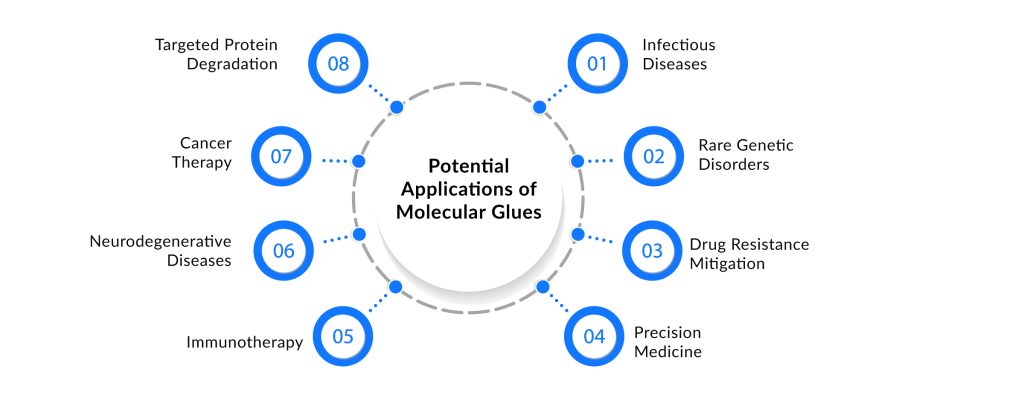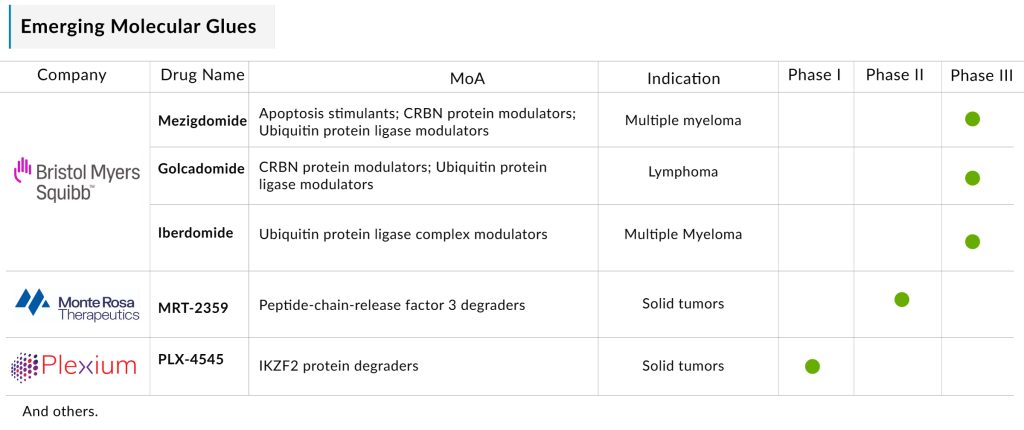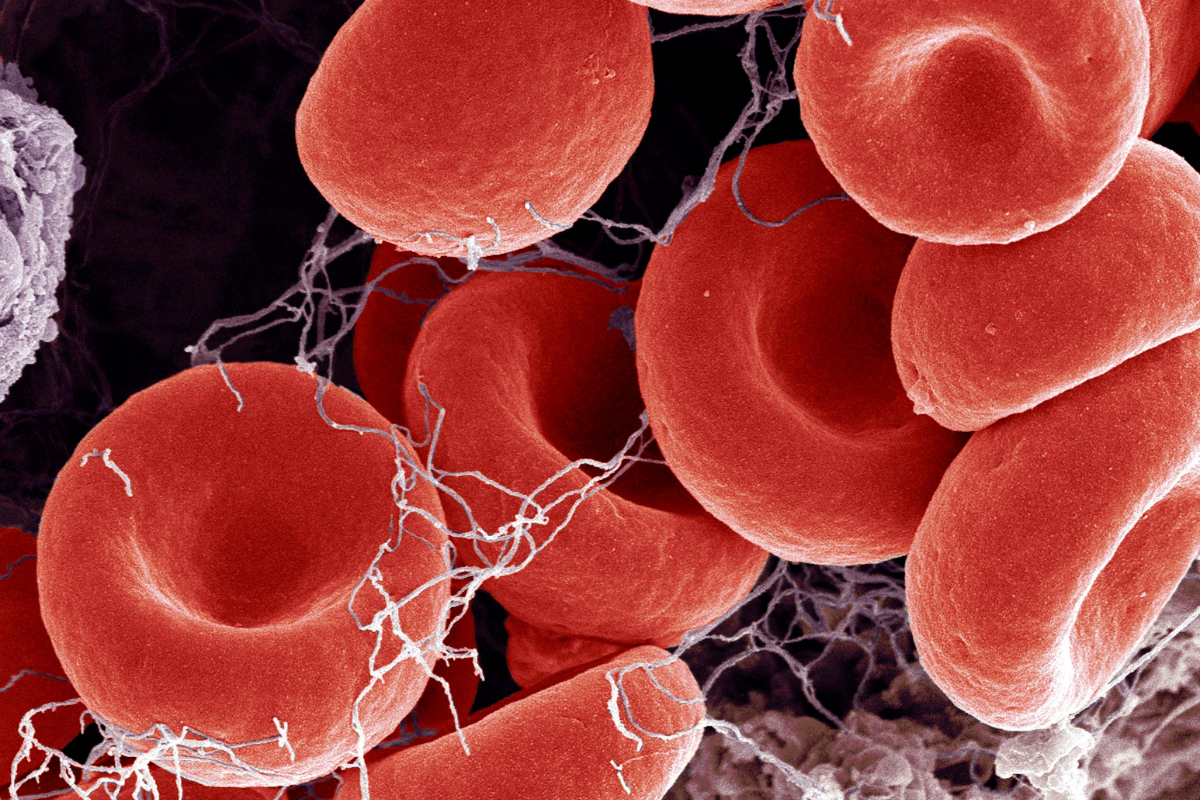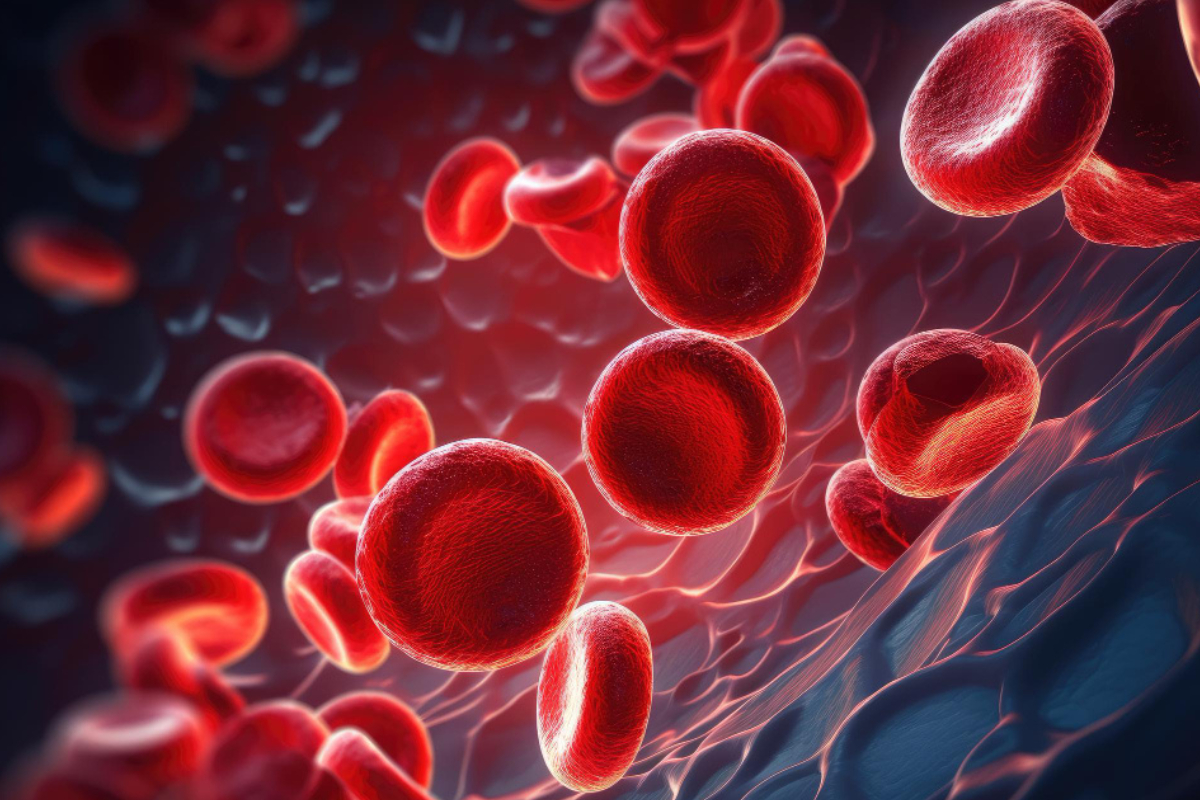The Rise of Molecular Glues: Transforming Protein-Protein Interactions into Therapeutic Opportunities
Jan 10, 2025
Table of Contents
Molecular glues are a groundbreaking class of small molecules that are gaining significant attention in the field of drug discovery. These compounds offer a novel approach to modulating protein function, especially for challenging targets that have been difficult to address using traditional drug discovery methods. By harnessing the power of cellular machinery, molecular glues can induce targeted protein degradation, providing an exciting new therapeutic strategy, particularly in cancer and other diseases associated with aberrant protein regulation.
What are Molecular Glues?
Molecular glue compounds are a distinct class of small molecules capable of altering protein-protein interactions (PPIs) and interactomes by either degrading, stabilizing, or activating target proteins upon binding. These compounds are gaining recognition for their potential in treating human diseases, including cancer. Research indicates that small-molecule molecular glues could target a wide range of proteins critical to disease development, many of which were once considered undruggable. Notably, many molecular glue compounds with strong anti-cancer effects can bind and regulate multiple essential protein targets. Furthermore, multiple molecular glue compounds with diverse chemical structures can also bind to a single key protein target. The versatile nature of molecular glue–protein interactions provides significant potential for the advancement of small-molecule molecular glues, which can serve as valuable tools for understanding disease mechanisms and enhancing drug development, particularly for treating cancer.
Downloads
Click Here To Get the Article in PDF
Recent Articles
- Eli’s Jaypirca: A Beacon of Success in the BTK Inhibitor Market
- Alnylam’s lumasiran results; AZ’s oncology drug; Astellas Roxadustat; Evotec’s partnership with ABL
- BGB-16673 Breakthrough: A Tolerable Triumph in Rapid Clinical Responses for Relapsed/Refractory B...
- BeiGene’s Brukinsa Approval; FDA Approval to Seagen’s TUKYSA; NICE Recommends Alnylam’s Amvuttra;...
- Bristol Mayer Squibb — The Undisputed Leader in the Molecular Glue Arena
Types of Molecular Glues
Molecular glues come in two primary forms: natural and synthetic. Natural molecular glues, such as thalidomide and its derivatives, were discovered by chance and have since been used in treatments for multiple myeloma by facilitating the breakdown of transcription factors like Ikaros. On the other hand, synthetic molecular glues are intentionally designed through rational drug discovery methods to target specific protein-protein interactions. Both types work by enhancing or stabilizing protein interactions, which ultimately leads to their degradation via the ubiquitin-proteasome system. Progress in synthetic molecular glues is broadening their potential to target previously “undruggable” proteins in diseases like cancer and neurodegenerative disorders.
Mechanism of Molecular Glues
Molecular glues work by promoting or stabilizing interactions between a target protein and an E3 ubiquitin ligase. These small molecules act as “connectors,” bringing the two proteins together and triggering the ubiquitination of the target protein. Once tagged with ubiquitin, the target protein is recognized by the proteasome, which degrades it. This leads to the elimination of the harmful protein, rather than just blocking its function. By leveraging the body’s natural protein degradation mechanisms, molecular glues offer a novel drug design approach, especially for targets that are difficult to treat with traditional methods.
Applications of Molecular Glues
Molecular glues have wide-ranging potential in therapeutic fields, especially in cancer and neurodegenerative diseases. They work by targeting and degrading disease-related proteins that are usually resistant to conventional small-molecule inhibitors, making them effective for addressing “undruggable” proteins. For instance, thalidomide analogs like lenalidomide are approved for treating multiple myeloma by promoting the degradation of specific transcription factors. Research is also ongoing to explore their use in solid tumors, immune disorders, and viral infections. The distinct ability of molecular glues to induce selective protein degradation offers a novel approach to drug development, broadening the scope of therapeutic options.

Approved Molecular Glues Available in the Market
At present, BMS is the sole company with approved products available in the molecular glue market. The approved molecular glues include REVLIMID, POMALYST, and Thalomid. REVLIMID is prescribed for adults with multiple myeloma, either in combination with dexamethasone or as a maintenance therapy after autologous hematopoietic stem cell transplantation. Its use in individuals with chronic lymphocytic leukemia is restricted to controlled clinical trials, and its safety and effectiveness in pediatric patients remain unestablished.
Whereas, POMALYST is prescribed for adults with multiple myeloma in combination with dexamethasone. It is intended for patients who have undergone at least two prior treatments, including a proteasome inhibitor and lenalidomide, and whose disease progresses during or within 60 days of the last treatment. Its safety and effectiveness in children have not been determined.
Current Clinical Development of Molecular Glues
Over 50 companies are currently active in the molecular glues pipeline space across the globe and evaluating more than 60 molecular glues in different stages of development. The promising products in the molecular glues competitive landscape include Mezigdomide, Golcadomide, Iberdomide, and BMS-986497 (Bristol Mayer Squibb), E 7820 (Eisai Co Ltd), MRT-2359 (Monte Rosa Therapeutics, Inc), RMC 6291 and RMC-6236 (Revolution Medicines, Inc.), ICP-490 (InnoCare Pharma), CFT 7455 (C4 Therapeutics), NX-5948 and NX-2127 (Nurix Therapeutics, Inc.), GT919 (Gluetacs Therapeutics), PLX-4545 (Plexium), DKY709 (Novartis Pharmaceuticals), NST-628 (Nested Therapeutics), SP-3164 (Salarius Pharmaceuticals, Inc.), and others.
The anticipated launch of these emerging therapies are poised to transform the market landscape in the coming years. As these cutting-edge therapies continue to mature and gain regulatory approval, they are expected to reshape the molecular glues market landscape, offering new standards of care and unlocking opportunities for medical innovation and economic growth. Additionally, the launch of these therapies will further bring stiff competition in the space as currently, BMS is the only company with approved molecular glues.

Recent Developments in Molecular Glue Landscape
- In May 2024, Takeda Pharmaceuticals announced an exclusive licensing deal with China-based Degron Therapeutics to develop novel molecular glue degraders for various oncology, neuroscience, and inflammatory disease targets.
- In May 2024, NEOsphere Biotechnologies GmbH announced a collaboration with Kymera Therapeutics, Inc. focused on unlocking undrugged or poorly drugged disease-causing protein targets that can be only or best addressed by Targeted Protein Degradation. Under the agreement, NEOsphere Biotechnologies will utilize its target- and E3-agnostic platform to screen molecular glue compounds on a proteome-wide level and in a native context.
- In March 2024, Nurix Therapeutics, Inc. announced that the FDA had lifted the partial clinical hold on the U.S. Phase Ia/Ib study evaluating NX-2127 in adults with relapsed/refractory B-cell malignancies. The partial clinical hold on the study was announced by Nurix on November 1, 2023, following the company’s communication to the FDA of its intention to transition to an improved manufacturing process.
- In November 2023, Kymera Therapeutics shared promising results from the Phase I clinical trial of its lead program, KT-474, marking a significant milestone in the field of targeted protein degradation (TPD).
- In September 2023, Orionis Biosciences, a privately held life sciences company with an integrated drug discovery and chemical biology platform, announced a multi-year collaboration with Genentech, a member of the Roche Group, to discover novel small molecule medicines for challenging targets in major disease areas, including oncology and neurodegeneration. Under the terms of the agreement, Orionis will be responsible for the discovery and optimization of molecular glues for Genentech’s designated targets, while Genentech will be responsible for subsequent later-stage preclinical, clinical development, regulatory filing, and commercialization of such small molecules.
Future Promise of Molecular Glues
Molecular glues represent an innovative and transformative approach to drug discovery, offering a new paradigm for targeting traditionally “undruggable” proteins. Unlike conventional small molecules, which typically inhibit or activate a protein directly, molecular glues facilitate the interaction between two distinct proteins, leading to the degradation or modulation of a specific target.
This ability to selectively and precisely orchestrate protein interactions holds immense promise for treating diseases driven by aberrant protein functions, including cancer, neurodegenerative disorders, and autoimmune conditions. With the advancement of proteomics, chemical biology, and high-throughput screening technologies, the identification and optimization of molecular glue candidates are becoming increasingly feasible, paving the way for new therapeutic modalities.
Additionally, ongoing developments in medicinal chemistry will enhance the rational drug design of molecular glues, focusing on their interaction with the immune system and their potential as small-molecule drugs. Integrating molecular glues with PROTACs technology is anticipated to yield powerful therapeutic agents, especially in targeting transcription factors and nucleic acids in cancer cells.
Looking ahead, molecular glues have the potential to significantly expand the druggable proteome, addressing gaps where traditional approaches fall short. Their small size and high specificity also position them favorably for improved bioavailability and fewer off-target effects. Emerging technologies such as artificial intelligence and machine learning are expected to accelerate the discovery of molecular glues by identifying cryptic binding sites and predicting protein-protein interaction landscapes.
As the field matures, molecular glues may serve as cornerstone therapies in precision medicine, enabling tailored treatments for complex diseases. Collaborative efforts between academia, biotech companies, and pharmaceutical giants are likely to catalyze innovation in this field, turning molecular glues into a powerful tool in the drug development arsenal.

Downloads
Article in PDF
Recent Articles
- Bristol Mayer Squibb — The Undisputed Leader in the Molecular Glue Arena
- Antibody–Drug Conjugates: An Emerging Concept in Cancer Therapy
- BGB-16673 Breakthrough: A Tolerable Triumph in Rapid Clinical Responses for Relapsed/Refractory B...
- BeiGene’s Brukinsa Approval; FDA Approval to Seagen’s TUKYSA; NICE Recommends Alnylam’s Amvuttra;...
- Alnylam’s lumasiran results; AZ’s oncology drug; Astellas Roxadustat; Evotec’s partnership with ABL



